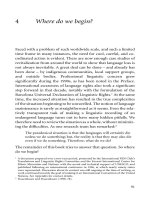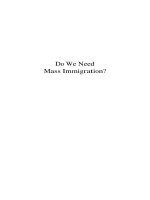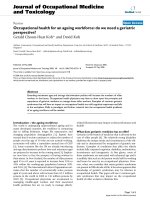Planning transport for future city regions – do we have the tools we need
Bạn đang xem bản rút gọn của tài liệu. Xem và tải ngay bản đầy đủ của tài liệu tại đây (89.47 KB, 11 trang )
Institute for Transport Studies
FACULTY OF ENVIRONMENT
Planning Transport for Future City Regions – Do
we have the tools we need?
UCL 24th September 2015
New Approaches to Appraisal –
Addressing Strategic Fit
Tom Worsley Visiting Fellow
ITS
The Genesis of Strategic Fit
HM Treasury
Public Sector Business Cases – Using the Five Case Model
Supplementary Green Book Guidance on Delivering Public
Value from Spending Proposals
Department for Transport
Transport Business Case 2010
The 5 Transport Business
Cases
Financial: affordability, funding, financial risks, contributions
Management: governance, risk management, stakeholders
Commercial: procurement, capability, risk allocation
Economic: Green Book/WebTAG Cost benefit analysis
Strategic Case: Fit with policy, need for the scheme, timing
Financial, management and commercial cases largely a set of
yes/no decisions
Economic case both yes/no (BCR>1.0) and ranking with
constrained budget
Role of Strategic Case not specified
Refresher: Economic Case
Economic, environmental, social impacts, using monetised,
quantitative and qualitative assessment and public
accounts
Concept of economic welfare, using willingness to pay and
other methods for valuing non-market impacts. Dominance
of time savings.
National interest – a BCR– for go/no-go and ranking decisions
Standard documented methods – consistency across a wide
range of decisions
Dependence on a transport model, showing how people
respond to changes in networks and changes over time
Content of the Strategic Case
Complementing the economic appraisal – making it more
meaningful/accessible:
• Case for change,
• Why now
• Drivers of change
• Options considered
Contribution to wider transport and government policy
objectives
Who/where are the beneficiaries?
Note:5 pages of text on Strategic Case in DfT Guidance –
contrast with WebTAG’s detailed coverage
Strategic Fit- the Issues
Economic case is not the only influence on decision-makers:
• Wide range of BCRs for approved schemes eg RIS BCRs range from 2
to 14
Other considerations
• “Arms’ lengthening” of decision-making to Highways England and to
Network Rail – 5 year budget has put an end to ‘chasing the BCR’
• Devolution has made ‘place’ matter more – what will the scheme do for
Grimsby?
• Scepticism about welfare economics, time savings
• Modelling and appraisal challenges – eg changes in reliability
• Policy priority of the economy, productivity and growth
Strategic fit – the
Opportunities
To “market” the economic appraisal story – much of the
Strategic Case is about explaining the costs and benefits
To focus on the things that matter most to policy makers
To extend the appraisal and modelling to cover:
• “GVA effect”
• Place – where are the benefits most likely to occur?
An opportunity, not a watering down of evidence based
analysis.
Strategic fit – the challenges 1
Estimating the local, regional or national GVA effect – is there a
cookbook?
• DfT’s Transport Investment and Economic Performance sets out
framework – business cost savings, static and dynamic effects – but no
usable DfT endorsed model.
• Several methods exist – consultants’ initiatives – risk of ‘black box’
• Most are based on agglomeration – improvements in connectivity in a well
connected place increase productivity
• Models struggle with gains from trade – each Northern city’s growth
increasing because of better transport between them
• How robust are the models – where do they fit in DfT’s assurance
framework? Is narrative enough?
Strategic fit – the challenges 2
Whose policy objectives should the scheme fit?
• Arms’ length transport providers’ or local objectives?
• Allocation of rail capacity – local or intercity?
• Highways England roads – local employment creation near an
interchange?
• Devolved City Region decisions – competition or national
controls?
• Should cities with growth ambitions be constrained by DfT planning
totals when making the case for investment?
• Does a scheme which is ‘good for Sheffield’ have to demonstrate a
good BCR?
Strategic fit – the challenges 3
Role of the Strategic Case in the TBC – overarching summary
or new information?
Double counting – additional benefits in the strategic case or
different ones from the economic case?
Relationship between economic benefits and GVA effects –
are big differences plausible?
Metrics and counterfactual pose problems – a present value of
GVA? What other policies or programmes grow the
economy?
How to judge strategic fit – what constitutes ‘good’?
Strategic fit - assessment
Few transport business cases are published, either as a whole or
in part
DFT has to date shown reluctance to set any rules – contrast with
economic case
Opportunity to extend the role of evidence based analysis beyond
the cost benefit analysis and meet policy objective.
Progress has been made in estimating impacts, although focused
on intra-city rather than on inter-city connectivity.
Some rules might be needed about control totals – where do the
‘new’ jobs come from ?– and about methods









